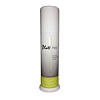

April is Autism Awareness Month. Autism Awareness Day is April 2, honored throughout the world. In recognition of how important awareness of this condition is, I would like to share my own approach to treating this condition.
I will start by providing an excerpt from my new book called “Adrenaline Dominance”, and end with some e-mail reports that I received from a patient with a three year old son with autism.
Based on what I know about this condition, I strongly suspect that excess adrenaline is involved. Since the incidence of autism is rising, it is becoming increasingly important to recognize this disorder and understand healthy approaches to treating it.
I feel that autism may be an extreme form of what I designate as a creative-type of ADHD. This type of ADHD is commonly referred to as ADD. However, in these people, their hyperactivity is limited to the brain. Adrenaline, as a neurotransmitter in the brain, provides both intelligence as well as an enhancement of creativity. Autistic children can be extremely intelligent-some of them have been known to memorize a phonebook. At the same time, exceedingly high levels of adrenaline in the brain, I suspect, is the reason they find it difficult to communicate. They shrink away from any sensory input, including eye contact, in order to decrease the amount of stimulus to their over-adrenalized brains.
Excess adrenaline can certainly create sleeping problems in these children, and perhaps contribute to anger issues since it is the “fight-or-flight” hormone.
As I have previously pointed out, the brain uses more sugar than any other part of the body. However, the creative brain requires much more sugar than a “normal” brain because it is more active. Accepting the fact that the autistic brain represents an exceptional amount of creativity, then one would also have to accept that the autistic brain requires an exceptional amount of sugar to fuel it. Because of this need for high levels of sugar, the body continuously pours out adrenaline to raise sugar levels for the brain via a process called gluconeogenesis.
My approach to treating these children is simply to lower adrenaline levels in the brain. To accomplish this I recommend using a 5% transdermal progesterone cream to help control insulin and adrenaline, and a diet that includes large amounts of low-glycemic carbohydrates, especially green vegetables, in order to provide a steady supply of fuel for the brain. Once adrenaline is lowered, the mind will stop racing. The lowering of adrenaline also prevents over-stimulation from sensory input, allowing the children to communicate more effectively. In addition, I would recommend certain supplements, including digestive enzymes to help with digesting the vegetables, coconut oil and vitamin D3 for the brain, and a B vitamin supplement. Several of my patients who were mothers of autistic children followed this protocol for their children and saw dramatic improvement. One of these mothers included the following brief note at the end of a letter:
My son, Frank, is also using your progesterone cream since February. Frank (age 15) has autism. He has been less anxious and calmer. He is more outgoing in social situations. He has been voted student of the month for February and March. At school he is participating more, and the teaching staff finds less prompting is necessary. Overall, lots of nice changes.
To emphasize the dramatic effect that the lowering of adrenaline levels can have on a child with autism, I have included the following:
These e-mails were sent to me from the mother of a three year old child with autism who had been essentially non-communicative prior to the treatment started on 02/17/2014.
02/20/2014:
Ian has been great! We are all really impressed with him. He has HEAPS more energy, his speech has improved a lot suddenly, and he has been falling asleep amazingly easily and staying asleep. It is 9pm now, I am ready to pass out and he is super happy and lively and drawing and playing! We have never seen him this bright!
03/17/14:
Ian is doing amazingly on your 5% progesterone! He is really starting to talk! He is able to put more words together and really trying to communicate. His energy and focus is way better. We are super delighted with him and cannot believe the change. It is getting some attention in the alternative health circles that I frequent.
03/24/14:
I am going to have to really study this subject now as Ian is doing REALLY WELL on your program! His energy is up, his speech is exploding, and he is acting so much more like a regular little boy. It is great. Even his GP is starting to get impressed; she is coming around and getting interested in this field!
For anyone interested in more information, please e-mail me at meplatt2@gmail.com or go to my website to purchase Platt Pro 5% progesterone cream.

Leave a Reply